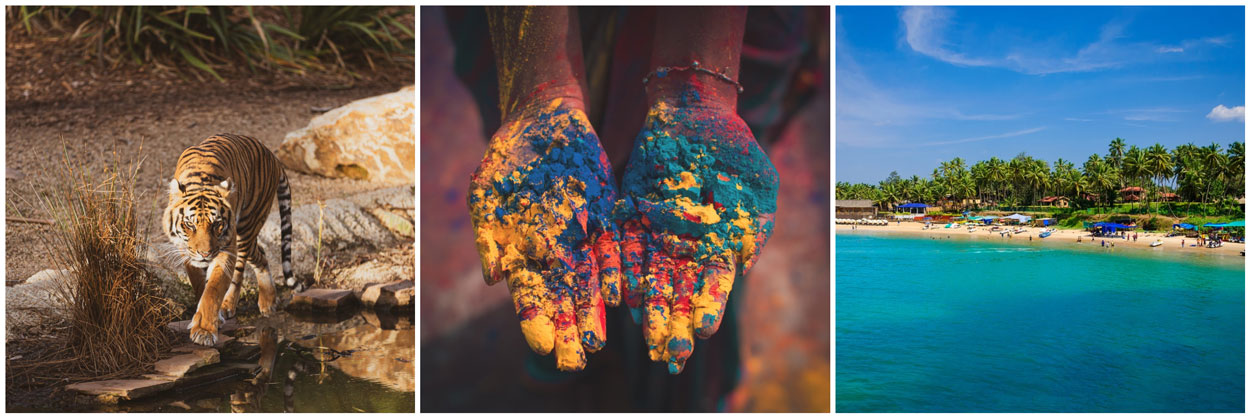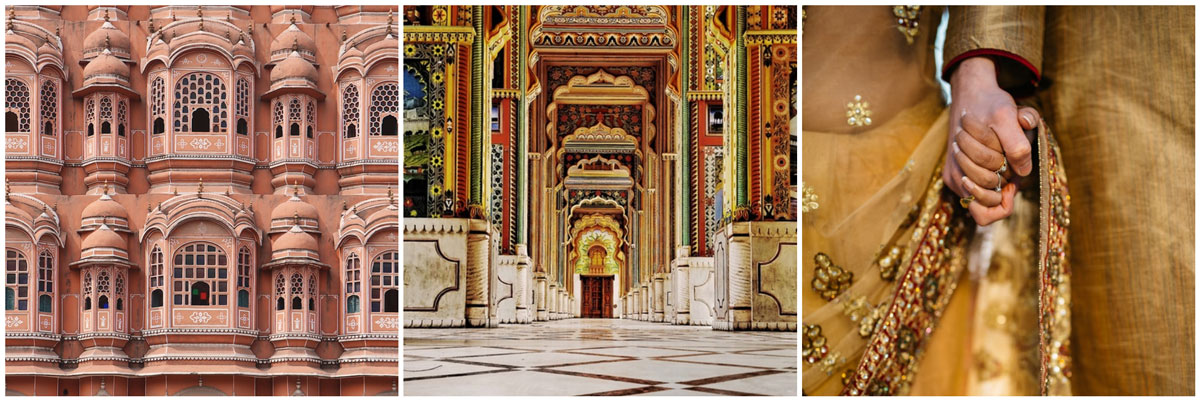With a vibrant culture and diverse landscape, India promises a trip brimming with colour and wonder. Whether you're exploring the foothills of the Himalayas, bustling cities, or the glorious beaches of Goa, there's a vast amount to take in. Whilst there's so much to be excited about, all trips come with the possibility of something going wrong, which is why having the right travel insurance is essential.
Holiday Extras travel insurance policies come with protection for things such as emergency medical care, cancellations and lost baggage. Our bronze, silver and gold cover levels give you the flexibility to choose the protection that suits your trip, so you can travel with confidence.
Do I need travel insurance for India?
Whilst it is not a legal requirement, it's a good idea to get reliable travel insurance for any trip abroad, especially when visiting India. There are no reciprocal healthcare agreements between India and the UK. This means without travel insurance, you would need to front any medical costs yourself, should you unexpectedly require medical treatment. In the case of an emergency repatriation back to the UK, the bill could come at a high cost.
Medical costs aside, knowing you’re covered for things such as lost baggage, unexpected illness, and flight delays means you can relax and focus on all India has to offer.

Is travel insurance to India expensive?
The price of insurance can vary depending on a number of factors. Factors influencing the price can include your age, trip length and any activities you might be taking part in.
If you have medical conditions, these can also affect your policy premium. If you are travelling with a medical condition, insurers may see this as a higher 'risk', potentially making your policy cost more. For more information on this, take a look at our page dedicated to Holiday Insurance with Pre-Existing Medical Conditions.

AnywhereGP: 24/7 Medical Help
Powered by Air Doctor
We're thrilled to introduce AnywhereGP, powered by Air Doctor – your on-the-go medical solution abroad!
Included FREE with every Holiday Extras travel insurance policy, it provides fast, reliable medical support for everything from minor illnesses to urgent concerns, keeping you supported along the way.
Does travel insurance for India include activities?
India offers an incredible variety of experiences, from trekking in the Himalayas to surfing in Goa and exploring wildlife-rich national parks. With so much to enjoy, it’s important to make sure your travel insurance covers the activities you’re planning. Some activities are included as standard, while other higher-risk activities may require an add-on or approval from the underwriter.
Winter Sports
Heading to the snowy slopes of Gulmarg, Auli, or Solang Valley? If you're planning to ski, snowboard, or participate in other winter activities, you’ll need our Winter Sports add-on. This is designed to protect you whilst you enjoy the cooler side of India.
Water sports
Whether you're scuba diving in the Andaman Islands or surfing the beaches of Karnataka, some water sports could be covered as standard. If you're going for more adventurous options, like white-water rafting on the Ganges in Rishikesh, you will need the Extended Risk add-on.
Extended Risk add-on
Planning something a bit more daring? High-risk sports and activities may fall under our Extended Risk add-on. This provides cover for higher-risk activities and can be selected at the add-on stage before payment.
Use our handy activity checker to see whether your chosen activity or sport is covered as standard, or if you’ll need to add extra cover.
Do you need a visa to enter India?
To visit India, you must have a visa, unless you are an Overseas Citizen of India (OCI) cardholder. Depending on your situation, you may be able to apply for an e-visa. You can find out how to apply for a visa via the Indian Bureau of Immigration.
Some key things about buying a visa to India:
- Your passport must have an expiry date of at least 6 months after the date you arrive and have at least 2 blank pages.
- Be careful of scams. There are many sites online that try to imitate the official visa site and sell illegitimate visas. Only use the official government website to buy your visa.
- You can apply up to 120 days in advance, but must do so at least four days before your travel date.
Find more information on our Visa and Passports page or take a look at the official advice for travel to India on the UK Gov website.

Safety tips for travelling in India
Food and drinkAlthough it may be enticing to experience the joy of street food, many vendors are unsafe and can ultimately result in food poisoning. If you do want to try street food, minimise risk by choosing reputable or visibly popular stalls. Aim for hot cooked food, and avoid raw fruits and vegetables. You should also only drink sealed bottled water whilst visiting India.
VaccinationsVaccinations are recommended for UK citizens who are travelling to India. You should check whether you are due for any vaccines at least 8 weeks before you travel. You can check where to get vaccines and whether you have to pay on the NHS travel vaccinations page. Or check in with your doctors.
Air pollutionIndia is known for having severe air pollution in some areas, especially during the winter months from October to February. This tends to be worse in the north. Elderly people and children should be cautious and consider wearing a mask. If you have medical or respiratory conditions, you should consult your doctor before travelling.
Local lawsLaws in India can vary greatly from state to state. It's a good idea to be aware of the laws in the area you are travelling to. For example, some states have a ban on possessing and consuming alcohol and breaking these laws can result in a prison sentence.
Areas to avoidThere are some areas of India where the FCDO advises against all travel. You will not be insured to travel anywhere the FCDO advises against travel to. To keep up to date with areas that you should not travel to, you can check the foreign travel advice for India on the UK government site.
Let us answer your questions
What is the cost of travel insurance in India?
The price of your insurance policy can vary based on several factors. Your age, destination, and any pre-existing medical conditions can all affect the final premium. For a quick and easy quote, click the 'get quote' button and follow the on-screen instructions.
Are there any regions in India that I will not be covered for?
You will not be covered for anywhere that the FCDO advises against travel to. To find out what areas are advised against travel to, you can check the foreign travel advice for India on the UK government site.
Is it safe to go to India right now?
Yes, India is generally safe for tourists, but it’s important to use common-sense precautions and to do your research before travelling:
- Avoid any areas the FCDO advises against visiting.
- Watch out for petty crime and be mindful of local customs.
- Be careful with food and drinking water to avoid getting sick.
- Women, especially those travelling alone, should stay alert, as harassment and sexual assault can occur in some places.
Can I get travel insurance to India with a pre-existing condition?
It may be possible to get travel insurance to India if you have a medical condition. Whether we can cover you or not will depend on what condition you have and how you answer the medical declaration questions. You can declare your condition online or call up our friendly team, who will be happy to help you through the process.
What money should I take to India?
Although bank and credit cards are widely accepted in India, it's a good idea to carry some cash too for smaller vendors. The currency in India is the Indian rupee (INR). It's illegal for foreigners to bring Rupees into the country, so carry some pounds to exchange on arrival or withdraw cash once you’re there.
Holiday Extras Travel Insurance is sold and administered by Holiday Extras Cover Limited, registered office address: Ashford Road, Newingreen, Hythe, Kent CT21 4JF.
Holiday Extras Cover Limited is an insurance intermediary authorised and regulated by the Financial Conduct Authority, registration number 828848. You can check this on the Financial Services Register by visiting: http://register.fca.org.uk
Holiday Extras™ is a Trading Name of Holiday Extras Cover Limited. The insurance is underwritten by Great Lakes Insurance UK Limited. Great Lakes Insurance UK Limited is a company incorporated in England and Wales with company number 13436330 and whose registered office address is 1 Fen Court, London, United Kingdom, EC3M 5BN.
Great Lakes Insurance UK Limited is authorised by the Prudential Regulation Authority and regulated by the Financial Conduct Authority and the Prudential Regulation Authority. Firm Reference Number 955859. You can check this on the Financial Services Register by visiting: http://register.fca.org.uk
Our flight delay cover is underwritten by Astrenska Insurance Limited and serviced by Collinson Insurance Services Limited.









